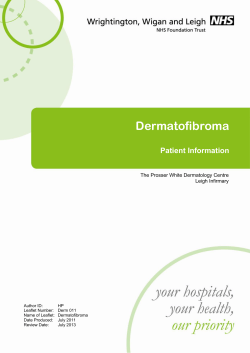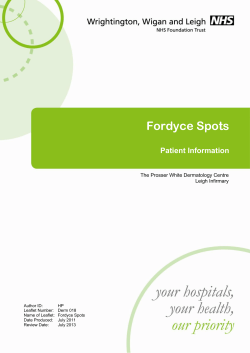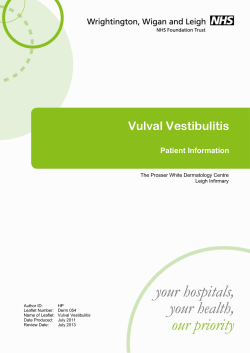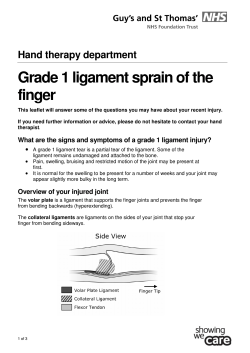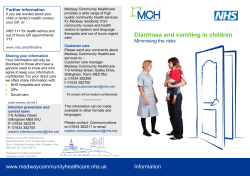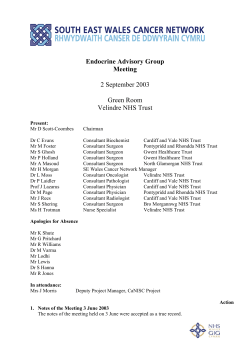
Who we are and what we do: May 2014
Who we are and what we do: Our business plan for 2014/15 May 2014 Welcome Public Health England at a glance Supporting local leadership Our achievements Health and Wellbeing Framework Protecting health Improving health Sustainable health and care services Capacity and capability Developing Public Health England Our people Our resources Develop PHE Contents Page Welcome from our chairman and chief executive . . . . . . . . . . . . . . . . . . . . . . . . . . . . . . . . . . . . . . . 3 Public Health England at a glance. . . . . . . . . . . . . . . . . . . . . . . . . . . . . . . . . . . . . . . . . . . . . . . . . . . . 4 Supporting local leadership for healthy communities . . . . . . . . . . . . . . . . . . . . . . . . . . . . . . . . . . . . 5 Some of our achievements in 2013/14 . . . . . . . . . . . . . . . . . . . . . . . . . . . . . . . . . . . . . . . . . . . . . . . . 6 A health and wellbeing framework for England . . . . . . . . . . . . . . . . . . . . . . . . . . . . . . . . . . . . . . . . . 7 This year’s work programme. . . . . . . . . . . . . . . . . . . . . . . . . . . . . . . . . . . . . . . . . . . . . . . . . . . . . . . . 8 Protecting the public’s health . . . . . . . . . . . . . . . . . . . . . . . . . . . . . . . . . . . . . . . . . . . . . . . . . . . . 8 Improving the public’s health and wellbeing . . . . . . . . . . . . . . . . . . . . . . . . . . . . . . . . . . . . . . . . 10 Improving population health through sustainable health and care services . . . . . . . . . . . . . . . . . 12 Building the capacity and capability of the public health system. . . . . . . . . . . . . . . . . . . . . . . . . 14 Developing Public Health England . . . . . . . . . . . . . . . . . . . . . . . . . . . . . . . . . . . . . . . . . . . . . . . 16 Develop PHE Our people . . . . . . . . . . . . . . . . . . . . . . . . . . . . . . . . . . . . . . . . . . . . . . . . . . . . . . . . . . . . . . . . . . . . . 18 Our resources. . . . . . . . . . . . . . . . . . . . . . . . . . . . . . . . . . . . . . . . . . . . . . . . . . . . . . . . . . . . . . . . . . . 19 2 Welcome Public Health England at a glance Supporting local leadership Our achievements Health and Wellbeing Framework Protecting health Improving health Sustainable health and care services Capacity and capability Developing Public Health England Our people Our resources Welcome from our chair and chief executive Our primary duty is to protect the public from infectious diseases and other environmental hazards and on this we will remain at all times alert and ready. This plays to our unique strengths in world-class science, disease registration, screening and vaccination programmes and surveillance systems, and our experts in emergency preparedness and response. This is a global concern as diseases cross borders so our work is UK orientated but international too. Our second responsibility is to improve the health of the people and reduce health inequalities. Good health is more than the absence of illness and disease and importantly it is not synonymous with the NHS, a common belief but in error. By itself the NHS cannot improve health as important as it is in the diagnosis and treatment of illness, with socioeconomic, behavioural and environmental factors mattering much more. Essentially this means that the choices people make about their health, whether to smoke and to drink, to exercise and about their diet are crucial to length and quality of life, but those who have fewer choices do less well than those with more. Local government reflects this understanding in its dual goal of driving local economic prosperity with an eye to how this is benefiting local people, known colloquially as wellbeing. Efforts to promote health and wellbeing, and tackle ill health, will have a better chance of success when they are framed in a way that aligns with how people think about the structure of their lives: their own choices and behaviours as individuals, and the importance of their environment, and of the communities around them. We believe that all three – people, places and communities – are key to improving health and wellbeing. Children will remain a key focus for PHE, we know that a good start to life is the best investment in a long and healthy life. PHE will play its supporting role in health improvement through communicating what matters to good health and what can be practically done by people themselves and by those who exist to serve them in government, local government, the NHS, business and the community and voluntary sector. In August we will publish a Health and Wellbeing Framework setting all this out and a small number of “Big Ambitions” that we believe, from the evidence, will make the greatest difference over the coming three, five and ten years. The measures of our success will of course be through improved outcomes and a narrowing in inequalities, and meantime delivering whatever we promise, and this document sets these out for this coming year. The risks of any national agency are complacency and arrogance, dangers we are alive to so the other important judgement of our success will be the views of those we most closely work with and support and so we commit to regularly seek and publish these. We hope you find this an interesting read and that you agree it articulates a stretching role for PHE as we enter our second year. David and Duncan David Heymann PHE board chair Duncan Selbie PHE chief executive 3 Welcome Public Health England at a glance Supporting local leadership Our achievements Health and Wellbeing Framework Protecting health Improving health Sustainable health and care services Capacity and capability Developing Public Health England Our people Our resources Public Health England at a glance PHE exists to protect and improve the public’s health and wellbeing and reduce health inequalities. We do this through advocacy, partnerships, world-class science, knowledge and intelligence, and the delivery of specialist public health services. PHE is the expert national public health agency that fulfils the Secretary of State’s statutory duty to protect health and address inequalities, and executes his power to promote the health and wellbeing of the nation. The remit letter from the Minister for Public Health sets out her requirements of PHE. PHE has operational autonomy. Our freedoms are set out in the Framework Agreement, which makes clear that PHE must speak to the evidence and its professional judgement. PHE has a Board with a non-executive chair and non-executive members. We employ scientists, researchers, public health professionals and essential support staff. PHE works transparently, proactively providing government, local government, the NHS, MPs, business, public health professionals and the public with evidence-based professional, scientific and delivery expertise and advice. PHE has four core functions: •protecting the public’s health from infectious diseases and other hazards to health •improving the public’s health and wellbeing and reducing health inequalities •improving population health through sustainable health and care services •building the capability and capacity of the public health system PHE provides specialist health protection, epidemiology and microbiology services across England. We are the lead for the UK on the International Health Regulations, and this extends to playing our part in protecting the UK from international health hazards, most obviously from communicable diseases. PHE will support local authorities in their duty to improve the public’s health, and through them CCGs, by providing evidence and knowledge of local health needs, alongside practical and professional advice on what to do to improve health and reduce inequalities, and by taking action nationally where it makes sense to do so. PHE in turn is the public health adviser to NHS England. PHE will enable the system to be held to account for its performance, for example by publishing public health outcomes data and exposing variation in performance. PHE will actively promote the public’s health, using the evidence as a challenge to local and national action and in providing the public with the information they need to take responsibility for their health. We know our effectiveness depends on how we behave so we will: •consistently spend our time on what we say we care about •work together, not undermine each other •speak well of each other, in public and in private •behave well, especially when things go wrong •keep our promises, small and large •speak with candour and courage Ultimately, together, we will be judged on the improvements secured in the public’s health through the Public Health Outcomes Framework. We will work with the NHS to make our health system the most transparent in the world. We can make early progress in some areas and in others it will take longer. The key is to build momentum and secure lasting change. 4 Welcome Public Health England at a glance Supporting local leadership Our achievements Health and Wellbeing Framework Protecting health Improving health Sustainable health and care services Capacity and capability Developing Public Health England Our people Our resources Supporting local leadership for healthy communities PHE exists to serve the public through the public health system, led locally by elected members, who have responsibility for the public’s health alongside the responsibility for inward investment, creating jobs, decent housing and resilient communities. Unitary and county authorities have a duty to improve the health of their local people; counties work in partnership with district councils that are responsible for housing, leisure, planning and environmental health. In our first year we established our 15 local centres, aligned with a number of local authorities. Each works with our national and regional specialist teams to deliver an integrated and tailored response to work alongside and support the local system to deliver its priorities. Each of our centres, in agreement with local partners, has developed a prospectus that sets out how PHE will support the local system in making a positive difference to the health and wellbeing of their people. PHE is the “national spine” for the public’s health, linking the local public health system and national action. Across all parts of the system, we commit to: •continue to develop the expertise of the specialist, national and local health protection teams handling around 9,000 local health protection issues a year •provide tailored support to local authorities on evidence-based and cost-effective ways to address health and wellbeing priorities and reduce health inequalities, including supporting local authorities to come together to tackle key regional challenges, for example, Well North which aims to support the poorest individuals and communities to improve their health •support local authorities in addressing the issues that are important to them, from rural health, to air pollution, to the differential impact of austerity •ensure that the eight PHE knowledge teams and intelligence networks provide trusted intelligence and help local systems with interpretation and insight to translate knowledge into practice •deepen the partnership with NHS England on local commissioning and quality assurance of national public health services •provide public health advice to NHS England and the local system on primary and acute care, community pharmacy, dental care and specialist commissioning •provide leadership and support for health emergency planning and response •work with local authorities to develop a resilient and skilled public health workforce •ensure a strong network of public health microbiology through national reference laboratories, regional collaborations with NHS hospital consortia for clinical microbiology and the food, water and environmental testing network •work with local systems to implement the Health and Wellbeing Framework 5 Welcome Public Health England at a glance Supporting local leadership Our achievements Health and Wellbeing Framework Protecting health Improving health Sustainable health and care services Capacity and capability Developing Public Health England Our people Our resources Some of our achievements in 2013/14 We successfully managed the transition to PHE and were fully operational in our new form, with all functions transferred safely, to ensure no “dip” in delivery. We published the first NHS Atlas of Variation in Diagnostic Services, showing significant differences in how health conditions are identified and monitored. We handled around 9,000 local health protection issues, including outbreaks of infection, chemical radiation and environmental incidents. 50% more smokers tried to quit during our Stoptober campaign than during other months of the year, according to a study by University College London, which concluded that the campaign was very cost-effective, saving 10,000 years of life. We launched the world’s largest single database of cancer. The cancer registry provides clinical information on the 350,000 cancers diagnosed each year in England and includes 11 million historical cancer records. Working with NHS England we introduced three new immunisation programmes – to protect babies against rotavirus, children against influenza, and people aged over 70 from shingles. Thirteen partnerships between us and universities won £47.5 million in Department of Health funding to set up health protection research units. Combining researchers from academia and PHE, the units will focus on public health priority areas ranging from immunisation to radiation hazards. Our Longer Lives website, which won first place in the “disrupting” category at the international 2014 Interaction Awards, allows local authorities to compare their mortality rates for the four most common causes of death. The NHS Abdominal Aortic Aneurysm Screening Programme for all 65-year-old men was rolled out nationally. Early detection through the screening programme will prevent around 2,000 deaths a year. Published ground breaking UK analysis of the Global Burden of Disease setting out the causes of ill health and mortality in the UK and the underlying risk factors that drive them. The NHS Health Check programme, which seeks to reduce premature death and ill health from heart disease, stroke, kidney disease and diabetes, and raise awareness about dementia, is now being delivered in every local authority across England. We generated over £180 million through commercial contracts for products and services, including the manufacture and clinical trials of life-saving medicines and vaccines, while supporting wider UK economic growth, exports and life sciences. We launched an emergency measles MMR catch-up campaign with NHS England to vaccinate unprotected children against measles, mumps and rubella. Seventy cases of measles were confirmed in the first three months (January to March) of 2014, compared to 673 in the same period of 2013. We provided expert health protection advice and support alongside colleagues in local government, the Environment Agency and the emergency services, as well as assisting in the recovery process, during last winter’s floods and storms. 6 Welcome Public Health England at a glance Supporting local leadership Our achievements Health and Wellbeing Framework Protecting health Improving health Sustainable health and care services Capacity and capability Developing Public Health England Our people Our resources A Health and Wellbeing Framework for England This business plan sets out the key steps and measures we will be taking this year. However, the challenges we face are complex and we need a sustained focus on the critical issues over a period of many years, and so we are doing two things. First, in August, we are publishing a Health and Wellbeing Framework for England to provide a compelling account of the challenges to health, which will set out the interventions we believe would improve health and reduce inequalities, and the impact of acting now on our health in the future. Best start in life Dementia TB Big Ambitions for the public’s health Alcohol Tobacco Obesity Of course healthcare matters. But the truth is that we have all focused more on treatment and illness than on prevention and resilience. This is not where we need to be. The promotion of wellness and resilience, prevention and early intervention should be our watchwords, helping people to stay as healthy as they can be for as long as possible, recognising that each stage of life is a foundation for the next. And crucially, intervening before conditions become unmanageable. This is not about spending more money, it is about making sure we get the best impact for the money we already spend – being clear on what works and ensuring effective interventions are adopted at scale and pace The Health and Wellbeing Framework will provide a menu of evidence-based interventions that all engaged in improving health can adopt as, together, we seek to transform the health of the people of England. including of course the public itself, and begin to reverse the gaps in life expectancy and years of healthy life. We will articulate these through the Health and Wellbeing Framework and these are most likely to include tobacco, obesity, alcohol, tuberculosis, dementia and every child having the best start in life. We are ambitious and confident because we have to be, and because many large-scale public health challenges have already been tackled successfully. From reducing teenage pregnancy rates by 40%, making huge strides in reducing healthcare-associated infections through to the collective efforts of local government to address poor school attainment in London, we know that together we can secure real gains for everyone’s health and wellbeing. Second, we want to maximise our impact through focusing on a small number of Big Ambitions for the public’s health for the next three, five and 10 years. It is obviously important that these ambitions connect with real people living in real places who often live lives where healthy behaviours are not their first consideration. By focusing on a small number, each of them rooted in the evidence, we hope to galvanise all those involved in health and care, 7 Welcome Public Health England at a glance Supporting local leadership The year ahead Our achievements Health and Wellbeing Framework Protecting health Improving health Sustainable health and care services Capacity and capability Developing Public Health England Our people Our resources next page This section sets out what we plan to do against each of our four core functions but does not encompass all that we will undertake over the full year. We have presented this to show shared commitments, those that are principally for PHE, and our unique capabilities. Protecting the public’s health: this year’s work programme Our primary duty is to protect the public’s health. We provide national and international leadership and scientific advice to reduce harm from infectious disease and environmental hazards. We ensure there are effective surveillance arrangements in place nationally and locally to identify threats and for preparing, planning and responding to health protection concerns and emergencies. Shared commitments Key PHE actions •work with NHS England to extend the childhood flu vaccination programme to all children aged 2-4 and pilot the delivery of flu vaccinations to primary school aged children and those in secondary school years 7 and 8 •publish the collaborative TB strategy by September 2014 Our diverse and expert workforce applies unique knowledge and scientific skills and capabilities across epidemiology, microbiology and environmental hazards. •develop plans with Genomics England and NHS England as part of the 100,000 genomes project to apply whole genome sequencing to increase our understanding of severe sepsis, and to use disease registry data to support the cancer and rare disease aspects of the 100,000 genomes project •publish the first report of the English Surveillance Programme for Antimicrobial Utilisation and Resistance by October 2014 •reduce the range of variation in local levels of performance of immunisation and screening programmes, while improving or at least maintaining the national levels of performance •develop a programme in support of national and local government to reduce the 25,000 deaths each year in England attributable to air pollution by March 2015 •work with the Department of Health to implement the Elliot Review on the future of the Public Analyst Food Laboratories by August 2014 •deliver the data capture system for reporting healthcare-associated infections by March 2015 •support the cost-effective procurement of the meningococcal B vaccine by March 2015 •run a pilot programme of whole genome sequencing for TB from July 2014 to bring next generation sequencing into use for public health and complete feasibility studies for pilot programmes for HIV and hepatitis C virus •lead delivery of Exercise Cygnus (October 2014) to test the nation’s ability to respond to a flu pandemic 8 Welcome Public Health England at a glance Supporting local leadership Our achievements Health and Wellbeing Framework Protecting health Improving health Sustainable health and care services Capacity and capability Developing Public Health England Our people Our resources Protecting the public’s health Our capabilities Our key capabilities include: •we maintain a robust system for the detection, assessment, management, control and reporting of new and emerging threats to public health ranging from emerging infections to climate change •we provide specialist investigation and control of communicable disease outbreaks, chemical incidents, radiation and other environmental hazards •we ensure effective public health emergency preparedness, resilience and response in the UK, including providing support to local and national resilience partners and to international crises as part of our role in disaster risk reduction •we provide the evidence-based science and clinical practice in specialist microbiology in support of the wider public health system and NHS hospitals •we protect and improve health by controlling and reducing risks to health from environmental hazards, ranging from weather related extreme events to radiation and chemical threats •we are accelerating the application of genomics technologies to improve the treatment of individuals and support the wider control of disease •we develop and manufacture appropriate biopharmaceutical products •we undertake leading-edge translational research in vaccine development and infectious disease control •we deliver a unified, integrated surveillance system capable of detecting changes in patterns of disease and its determinants to help target interventions •we ensure high coverage of safe, cost-effective vaccines to reduce the burden of vaccinepreventable diseases 9 Welcome Public Health England at a glance Supporting local leadership Our achievements Health and Wellbeing Framework Protecting health Improving health Sustainable health and care services Capacity and capability Developing Public Health England Our people Our resources next page Improving the public’s health and wellbeing: this year’s work programme We will support local authorities, the NHS and central government to secure the greatest gains in health and wellbeing and reductions in inequalities through evidence-based interventions. We will act nationally where we are uniquely placed to do so. We will promote actions to build healthy places, people and communities, making the case for prevention and early intervention. Key PHE actions Shared commitments •launch the National Mental Health Dementia and Neurology Intelligence Network by June 2014 •at least 20% of the eligible population offered a NHS Health Check and aim to reach 66% take up of these offers by 2015 •work with NHS England to increase the number of eligible families receiving services from Family Nurse Partnerships to 16,000 by March 2015 and partner the expanded Troubled Families programme to support early intervention and improve health and wellbeing for vulnerable families •work with local authorities and NHS England to ensure readiness for the transfer of commissioning responsibilities for 0-5 child health services •improve recovery rates from drug dependency, recognising this as the core purpose of drug treatment, by supporting a shared ambition with local authorities for continuous improvement, through the provision of benchmarked data and bespoke support, particularly for commissioners and providers in the most challenged areas •make significant progress towards reaching a chlamydia detection rate of 2,300 per 100,000 by March 2015 •recruit one million dementia friends, in partnership with the Alzheimer’s Society, by March 2015 •deliver 750,000 quit attempts through the Smokefree marketing campaigns by March 2015 •deliver marketing campaign on smoking in cars with children in advance of the smoke-free legislation •through our social marketing plan, deliver a series of national campaigns that increase early diagnosis of cancer and other conditions by March 2015 •sign up 500,000 more families to Change4Life through the 10 magic moves and healthy eating Smart Swaps campaign by January 2015 •publish vision and action plan for improving blood pressure by December 2014 •roll out the national standard for Workplace Wellbeing Charter by March 2015 and work to activate and engage employers of all sizes in all sectors to recognise the return on investment for supporting the health and wellbeing of staff •publish draft advice on next steps to reduce sugar consumption in light of the draft Scientific Advisory Committee on Nutrition report by Spring 2015 •produce a report for government on the public health impact of alcohol and possible evidence-based solutions by Spring 2015 •review the emerging evidence on e-cigarettes to provide evidence-based recommendations to support smoking cessation, tobacco control and to inform the government’s future thinking by spring 2015 •to review the impact of obesity as a cofactor (with alcohol and hepatitis C) in other long-term liver disease and provide advice on evidence-based interventions and practice •support the National Suicide Prevention Strategy, including the production of an atlas of variation on suicide prevention and developing an appropriate measure on mental health to incorporate in the NHS Health Check programme •produce a national implementation framework for physical activity by October 2014 10 Welcome Public Health England at a glance Supporting local leadership Our achievements Health and Wellbeing Framework Protecting health Improving health Sustainable health and care services Improving the public’s health and wellbeing Our capabilities Capacity and capability Developing Public Health England Our people Our resources Imp rove PH Our key capabilities include: •we apply and translate scientific knowledge, expertise and advice, including from epidemiology and from social, behavioural and implementation science •we promote the public’s health, on the basis of the evidence and professional judgement •we deliver, manage, monitor and evaluate programmes and projects •we engage with and empower individuals, communities and populations to change their behaviour •we partner policymakers, researchers and practitioners to facilitate the implementation of evidence-based practice and policy •we support local government, the voluntary sector and the NHS to apply evidence and policy •we identify and champion cost-effective interventions that are good for health, society and the environment •we ensure that all have access to the best possible evidence on what works •we present information and intelligence that is tailored and targeted to specific audiences 11 Welcome Public Health England at a glance Supporting local leadership Our achievements Health and Wellbeing Framework Protecting health Improving health Sustainable health and care services Capacity and capability Developing Public Health England Our people Our resources next page Improving population health through sustainable health and care services: this year’s work programme We are the public health adviser to NHS England, and we will support NHS commissioners and providers as they seek to improve population health and tackle inequalities, and to develop more personalised, proactive care that can help each of us maintain the best possible health and wellbeing. Our specialist staff will provide the evidence and analysis to help the NHS and local authorities allocate their resources most effectively, with a greater shift towards prevention and early intervention. ustainable HC serv Shared commitments Key PHE actions •achieve at least 60% of centres providing bowel scope screening by March 2015 •publish the interim evaluation of the pilots of human papillomavirus primary screening as an alternative to primary screening by cytology by March 2015 •pilot 40,000 kits of the faecal immunochemical test for faecal occult blood bowel cancer screening and publish results by March 2015 •extend newborn blood spot screening to test for four additional disorders •pilot and evaluate the addition of pulse oximetry to newborn screening and link screening for cardiological defects from the antenatal to the newborn period •aim for 75% uptake for winter flu vaccine in people aged 65+ and support NHS England and local government to reduce winter emergency admissions •conduct a review of specialised services by November 2014 to identify key areas for action to optimise value and population outcomes in support of NHS England’s urgent and longer term work •support the local NHS to integrate public health by building the evidence base and sharing examples of people-focused, integrated preventative approaches •support local authorities to make the best use of resource through the rollout of the return on investment tools developed by the National Institute for Health and Care Excellence •review quality assurance functions for cancer and non-cancer screening programmes to deliver a more harmonised service where appropriate 12 Welcome Public Health England at a glance Supporting local leadership Our achievements Health and Wellbeing Framework Protecting health Improving health Sustainable health and care services Capacity and capability Developing Public Health England Our people Our resources Improving population health through sustainable health and care services Sust aina Our capabilities Our key capabilities include: •we act as NHS England’s public health adviser, and we support them through the professional staff in PHE and through teams permanently embedded in NHS England •we use our expertise in health economics, health intelligence and evaluation and system approaches to support NHS England to develop population-based effective systems of care, including commissioning of specialised and primary care services •we work with the NHS to deliver gold standard screening programmes in order to reduce the burden of disease and disabilities across the life course, tackling variations in performance and access across the country •we work with partners to encourage staff to make every contact count as an holistic opportunity to promote health and wellbeing more broadly •we lead, plan and implement immunisation programmes (including the procurement of vaccines and immunoglobulins) and provide specialist advice and information to reduce regional variations in performance ble HC s erv •we present the evidence on the return on investment of public health interventions for local authorities and the wider health and care system •we provide surveillance and evidence-based support to the NHS in reducing harm from healthcare-associated infections and particularly in tackling the emerging problem of carbapenem-resistant Enterobacteriaceae •we maintain and deliver the collection and reporting processes for the Systemic AntiCancer Therapy Dataset (SACT), working towards full integration into the National Cancer Registry Service Dev elop PHE 13 Welcome Public Health England at a glance Supporting local leadership Our achievements Health and Wellbeing Framework Protecting health Improving health Sustainable health and care services Capacity and capability Developing Public Health England Our people Our resources next page Building the capacity and capability of the public health system: this year’s work programme We will support the development of the public health system as a whole – ensuring access to the best evidence and intelligence, to ensure the current and future excellence of the public health workforce and by publishing outcomes to ensure transparency and promote improvement. We will work closely with local authorities, the Association of Directors of Public Health, the Faculty of Public Health, the Chartered Institute of Environmental Health, the voluntary and community sector, and the NHS as we build the capacity and capability of the public health system, as a whole. Capacity & Capabil Shared commitments Key PHE actions •work with the Local Government Association, Association of Directors of Public Health, Department of Health and Society of Local Authority Chief Executives to agree the model of sector-led improvement for public health by August 2014 •publish a Health and Wellbeing Framework for England by August 2014 and a web-based guide to the evidence and emerging best practice •support the Association of Directors of Public Health’s regional networks in their work on sector-led improvement by March 2015 •with key partners, co-design, develop, and pilot a single agreed approach to talent management across the public health system by March 2015 •work with national partners to improve career development and normalise staff movement across the public health system, addressing issues raised in the recent national surveys carried out by Ipsos MORI, the British Medical Association, the Association of Directors of Public Health and the Centre for Workforce Intelligence •work with partners in the NHS and local government to implement the Sustainable Development Strategy for Health and Care •support public health career development through piloting a Skills Passport by March 2015 as part of a review of the public health workforce strategy •develop the Public Health Outcomes Framework web tool with disaggregated data by equality characteristic and health inequalities by December 2014 •on behalf of the Chief Nurses in the devolved administrations and the Republic of Ireland we will lead in developing a five nations framework for nursing and midwifery on population health •support the establishment of the What Works Centre for Wellbeing by December 2014 •expand the Longer Lives web tool to include primary care indicators for diabetes (August 2014), health checks (August 2014), cancer and hypertension (October 2014) and measures on drug and alcohol treatment and recovery (December 2014) 14 Welcome Public Health England at a glance Supporting local leadership Our achievements Health and Wellbeing Framework Protecting health Improving health Sustainable health and care services Capacity and capability Developing Public Health England Our people Our resources Building the capacity and capability of the public health system Our capabilities Capacity & Capabil Our key capabilities include: •we work with local government and the NHS, providing practical support, tools, evidence and information to realise effective public health services and improved population health outcomes •we ensure professional governance is in place to support the professionalism of the expert public health workforce, and is linked to high-quality performance management and professional appraisal processes •we support the development of the public health workforce, including within PHE, to ensure people have the right skills, and providing opportunities for talent, leadership and career development for specialists and generalists across all employers •we exercise system-wide professional leadership functions, directly for PHE clinical and professional staff, through supporting partners to develop the wider public health workforce and working with the NHS to promote the population health role of all health care professionals •we accelerate the spread of effective and innovative practice at scale and pace •we support the international development of effective public health practice, providing expertise on public health issues globally and develop best practice in global health resilience and disaster risk reduction •we translate data, research and experience into practical evidence and guidance through our public health intelligence service, including publication of topic-based NHS Atlases of Variation •we maintain high-quality research capability to generate new knowledge to improve and protect health and drive the timely translation of research into public health practice •we enable the system to be held to account for its performance, for example, by publishing public health outcomes data and exposing variation in performance and ensuring the Public Health Grant is used appropriately 15 Welcome Public Health England at a glance Supporting local leadership Our achievements Health and Wellbeing Framework Protecting health Improving health Sustainable health and care services Capacity and capability Developing Public Health England Our people Our resources next page Developing Public Health England: this year’s work programme As we enter our second year, we will continue to develop our capacity and capability. We want to be an organisation that is recognised as a great place to work and a great partner to work with. Key PHE actions •implement staff survey action plans and act on staff feedback including ensuring leadership is more visible, communications are improved, and learning and development opportunities are highlighted, by November 2014 Outcomes for 2014/15 •implement an integrated workforce planning framework by September 2014 •improve the Employee Engagement score from the PHE staff survey from 52% in 2013 to 55% in 2014 •carry out a comprehensive strategic review of our functions and purpose to ensure that we deliver our responsibilities in the most efficient and effective way, doing more and new for less by October 2014 •maintain the proportion of our stakeholders who speak highly or very highly of PHE, in the annual stakeholder survey by March 2015 Develop PHE •to complete the PHE commercial strategy setting out how we will maximise our income generation and ensure alignment between our commercial, research and service delivery functions by October 2014 •PHE will go ‘digital first’. We need to improve our digital activity so we meet our users’ needs. This year we are developing a digital strategy, starting to rationalise our websites and improve our digital services, and getting the specialist digital skills we need. We will transition 15 websites to GOV.UK and NHS Choices by July 2014 •finalise options to create a “science hub” of national and international importance in protecting and improving the public’s health, based on the Science Hub Survey, and produce the outline business case by July 2014 16 Welcome Public Health England at a glance Supporting local leadership Our achievements Health and Wellbeing Framework Protecting health Improving health Sustainable health and care services Capacity and capability Developing Public Health England Our people Our resources Developing Public Health England Our focus on our people and our teams We will accelerate our investment in our staff in a number of ways: •grow our people through meaningful, open and objective appraisal based on equality and diversity principles, and identify and develop talent to ensure we have motivated staff with the right skills •shape the workforce for now and for the future through the implementation of an integrated workforce planning framework, to ensure we have the right people, in the right place, at the right time •provide a healthy and safe workplace, by implementing best practice to engage and support staff to achieve their potential, and work towards becoming an exemplar of health and wellbeing in the workplace •focus our efforts on creating high-performing teams, including through our leadership of staff from different professional groups within PHE, who feel valued, are supported to reach their individual and collective potential, and who live the civil service values of impartiality, integrity, objectivity and honesty •continuously improve the quality of our work and maximise our impact by fully embedding the PHE quality programme •implement our IT, estates, procurement and finance strategies to ensure we deliver best value for the tax payer •provide occupational health services whenever needed, so staff are supported to return to work, and are empowered to make healthy choices which enable us to ‘live’ the values that we promote •support the business by integrating HR support for our staff, underpinned by simple and effective systems and advice •embed sustainability into all our policies and practices •ensure our staff take full advantage of the resources of Civil Service Learning, and the talent and development programmes for the civil service 17 Welcome Public Health England at a glance Supporting local leadership Our achievements Health and Wellbeing Framework Protecting health Improving health Sustainable health and care services Capacity and capability Developing Public Health England Our people Our resources Our people Our four regions are coterminous with those of NHS England, and they also map onto the nine regional local government groupings. Each will nurture and support the local public health system and maintain an overview of the whole system’s progress in implementing the Public Health Outcomes Framework. They have a special responsibility for developing the wider public health workforce. In addition to our local centre and regional staff, we also have other expert staff including those based at Colindale in north London, Chilton in Oxfordshire and Porton Down in Wiltshire, and in Function Microbiology: national centres, regional laboratory network, the capability to identify infectious disease and production of Erwinase and anthrax vaccine Health protection: providing the surveillance and management for outbreaks of infectious disease and chemical and radioactive hazards a network of regional microbiology laboratories throughout the country. Expertise in radiation and chemical protection is provided at Chilton and by teams around the country, and offices in Scotland and Wales. Staff (WTE) 1850 890 Local centres and regions: regional and local staff providing public health advice to local authorities 950 Knowledge and intelligence: distributed across eight regionally located teams providing information on performance and variation 510 Screening (cancer and non-cancer): developing new programmes and quality assuring screening 275 Health and wellbeing: supporting local authorities, the NHS and central government to secure gains in health and wellbeing through evidence-based interventions and supporting behaviour change through social marketing 195 Finance, commercial and procurement 140 IT and estates 100 Human resources 55 Corporate support 145 We have four regions and 15 centres We have 5,110 staff (WTE) We have scientific campuses at Colindale, Porton and Chilton Our staff work from over 100 locations 18 Welcome Public Health England at a glance Supporting local leadership Our achievements Health and Wellbeing Framework Protecting health Improving health Sustainable health and care services Capacity and capability Developing Public Health England Our resources Our people Our resources We are funded primarily by the Department of Health although we also generate significant income from our portfolio of products and services, such as the manufacture of vaccines, provision of advisory and laboratory services, research and royalties. Breakdown of our government funding Local authority grants Our expenditure can be split into three main segments: £2,793.8m Ringfenced public health grants to local authorities Much of the funding we receive from the Department of Health is passed on directly to upper tier local authorities in England as ringfenced public health grants (£2.79bn) to enable them to discharge their public health responsibilities. Vaccines and counter measures We receive specific funding from the Department of Health to procure vaccines and other counter measures (£366.5m) £397.9m Net operating expenditure Vaccines and counter measures Breakdown of our external income Others Operating expenditure This reflects the costs both to run the organisation and deliver specific public health programmes (eg screening programmes, social marketing etc). Our net operating expenditure funding of £397.9m from the Department of Health is supplemented by £181m of commercial income that we generate. This funds the specific programmes of public health activity (£451.3m) and our administrative running costs (£127.6m). £366.5m £39m £51m Royalties NHS Laboratory testing £32m £18m Research £41m Sale of products 19 Public Health England Wellington House 133-155 Waterloo Road London SE1 8UG Tel: 020 7654 8000 www.gov.uk/phe Twitter: @PHE_uk Facebook: www.facebook.com/PublicHealthEngland © Crown copyright 2014 You may re-use this information (excluding logos) free of charge in any format or medium, under the terms of the Open Government Licence v2.0. To view this licence, visit OGL or email psi@nationalarchives.gsi.gov.uk. Where we have identified any third party copyright information you will need to obtain permission from the copyright holders concerned. Published May 2014 PHE publications gateway number: 2013479 This document is available in other formats on request. Please call 020 8327 6055 or email publications@phe.gov.uk
© Copyright 2025
